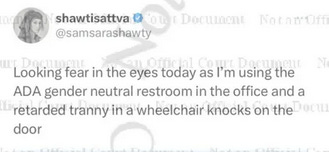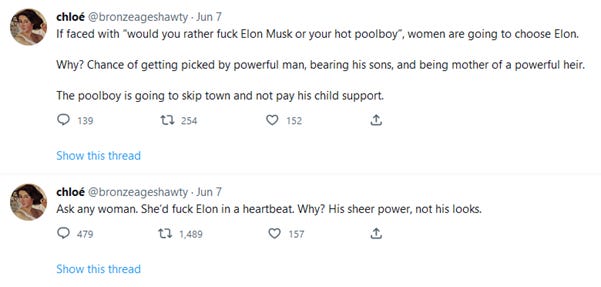Is There Any Point to Exposing Anonymous Bigotry?
Far more often than not, it's the bigots who win
Another conservative hero donned his cape this week.
At the University of Mississippi, which the media insists on referring to exclusively as “Ole Miss,” a black woman who was speaking as part of a planned protest event against the Gaza conflict was mobbed by frat boys who were way too comfortable with themselves in a world where everything is being filmed at all times. Or maybe they didn’t concern themselves with all that too much as there were about three brain cells in the entire crowd and they spent turns passing them back and forth to hide who was using them.
That synaptic prolapse with a five dollar haircut in the blue shirt on the right was being racist in a way that you usually only think of Georgian railroad workers in the 1920s as racist, making over the top chimpanzee noises while the butterball on the left looked at him in a way you want your spouse to look at you when you come home from work.
It didn’t take long for the internet to track down one James “JP” Staples and triangulate his social media profiles. The usual shunning ritual took place. He was reported and cast out of his fraternity who, let’s be completely honest here, judging by the way they’re cheering him in this video like Metropolis cheers Superman at the climax of the movie, absolutely one hundred percent approved of what he was doing but are disloyal enough to throw him under the bus for PR (who would have seen that coming?)
As it usually goes, Staples got profiled in the tabloid media, who dug up his old modelling shots and soundly reprimanded him. He’ll probably be headlining CPAC next year alongside Kyle Rittenhouse.
See, that’s the problem with exposing horrible people—the more online we become, and the more access we have to every dusty niche of human subculture (and they to us), stripping away vicious bigots’ anonymity starts to feel less like righteous justice and more like just connecting the worst people in the world with an audience. Like talent agents for biological waste.
I’ve sometimes wondered why we feel this desire to “out” people, and I guess what it comes down to, mainly, is that there’s a pragmatic reason and an emotional reason. Pragmatically we’re concerned about the safety of our communities. We don’t want to learn that our boss or our professor or our pastor is secretly the Banksy of Holocaust denial. Often, though, it feels like the emotional response is primary—we want bad things to happen to bad people. We don’t want people to quietly and happily get on with their lives while they’re making other people’s lives miserable.
I guess it comes back to cancel culture, really. You’re conducting the necessary first step of establishing a target, because you actually need someone to cancel, not just their disembodied behaviour. You are doing, in actual fact, what the priests do at the climax of every exorcism movie: You demand the demon give its name, because you can’t banish it otherwise.
That raises the question of whether the strategy is, in any way, effective. The verdict, from what I can tell, is… mixed.
One well-known recent example is the white supremacist comic artist Stonetoss, who had fiercely protected his anonymity for years, to the extent that he even scrubbed personal information from any public record he was able to have altered or redacted. The more challenging the target, though, the more tempting it is. Ultimately, some extremely determined amateur detectives cracked the case and found the weaknesses in his security—as it turns out, he put too much trust in the data security of the shitty low budget neo-Nazi websites he had accounts with under an email address that was (bizarrely for a man so very protective) his full real name at gmail dot com. So in March of this year the sleuths released their findings and outed Hans Kristian Graebner. His location, his job, his face.
Considering the extraordinary lengths that Graebner went to hide his identity, you would expect some fallout, but apart from about three days of controversy on Twitter (during which Elon Musk, a known and enthusiastic supporter of doxing people he doesn’t like, unsurprisingly sided with the alt-right yet again on this specific case) there was no follow up. Nobody actually knows this kid. There was no indication that he lost his job or that he even still has a job to lose given the lucrativeness of his merchandise and NFT rackets.
Hans Graebner can’t be cancelled because an important precursor to cancellation is that you have to be somebody to begin with. The exorcists finally deduced the demon’s name but it wasn’t Belphaghor, Baronet of the Thorned Principality of Filth, Reaper of Lost Children. It was Hans, IT guy on the afternoon rotation. He was a complete and total friendless loser. There might be some catharsis for us in that, as a little treat, a little omnomnom, but it certainly doesn’t diminish his reputation with his fans to know that. This isn’t shocking information. Stonetoss doesn’t fill the same niche in their lives that Andrew Tate fills. His fans are not disappointed that he’s a loser, at worst they feel nothing at all about it.
If you can believe the man himself, though, sales of his merch skyrocketed. His only comeuppance is increased visibility and support. He didn’t lose anything equivalent because he didn’t have anything to lose.
The effect of exposing the identities of shitty nobodies, naming and shaming them, is so one-sided in favour of the people being exposed that it kind of feels like a trap. We can consider the pragmatic argument to outweigh it, perhaps. I mean, sure—what if this is a person of influence? Would a spouse or a community want to know if their partner or their father or their beloved local schoolteacher, scout troop master, or birthday clown, was shrieking the N word at people on the regular behind an internet handle?
Maybe, but the weight of likelihood seems to be against us here. How often do awful anonymous accounts get exposed as influential or in any way notable individuals with people in their lives who would be shocked by the revelation? The only case that immediately comes to mind is Emily Youcis, the beloved ball park pistachio girl, a local celebrity among fans of the Philadelphia Phillies, who turned out to be just an absolute full on neo-Nazi.
More often you get a Chaya Raichik. She spent a couple of years posting anonymously online as LibsOfTiktok, a social media aggregator who sought out the most outrageous examples of progressive/woke/general LGBT outrage bait her audience in the latter Trump/early Biden years was primed to despise. High-exposure right wing personalities soon boosted the account to notoriety, enough that journalists at the Washington Post sought to rip off the mask and ultimately unmasked Raichik—a Brooklyn real estate agent.
Now, Raichik on full display has given us some fun gaffe moments as it turns out that she is extremely not-very-bright. But I’ve had to deal with a heck of a lot of real estate agents in my time and, let me tell you, her IQ level is very standard. Chaya Raichik is, as it turns out, a textbook personality for her profession, and it’s a profession that would never shock anyone to learn was running an account like LibsOfTiktok.
That’s the thing. People like Raichik, like Graebner, like that fuckin’ Staples guy probably, are forged in a certain environment, and the people surrounding them are the people who made them the way that they are. It’s actually very rare that the epithet-slinging radical ideologue lives and works among people who would be shocked or outraged to discover their online activities. It should rather not knock anyone over to learn that a young female member of a very prominent, very right wing, orthodox Jewish family should turn out to be a dopey real estate agent hurling shade at LGBT people on her Twitter account.
Her exposure lost her the respect of absolutely nobody who knew her personally. But it did absolutely amazing things for her career. She doesn’t need to spend her days gleefully handing out eviction notices anymore, not now that she’s on the government payroll as Oklahoma Department of Education’s chief censor, living the high life off the taxpayer’s wallet entirely on the strength of her ability to stand in front of a class of students and stammer about the wokeness and stuff while uncomfortably checking her phone.
Anonymity is still popular among reactionaries who just want to shitpost online, but as we’re introduced to example after example, people are cottoning on to the fact that you actually can speedrun fame, notoriety, and possible fortune just by doing some kind of random shitty bigotry and making hay with it when someone gets pissed off enough to try to serve you some old fashioned comeuppance.
At the very least, you’ll know Elon Musk has your back.
Ask Chloe Happe, of the social media moniker Shawty, a former employee of financial technology company Block, Inc., who was fired last year when someone reported her to her employer for tweets that were not very couth at all.
According to Happe, she and Elon Musk are mutual friends with somebody who offered to give her a direct line to Musk so that he could fund her free speech lawsuit against Block.
I have no idea how many friends a random shitposter has in common with the richest person on the planet but through some cursory investigation I strongly suspect that the mutual friend is Richard Hanania, who is almost as thirsty for Happe as he is for Sydney Sweeney.
But people like Happe or Raichik or fuckin’ Catturd or whoever else can cry all they like about getting unmasked, they know that one weird trick for getting rich in the modern age is to call a minority a retard and jump straight down the incredibly short shithead-to-Charlie Kirk Show pipeline.
So what’s my argument here? As is often the case I find I kind of have more questions than answers. It seems to go against what we’ve always been told about the game of social consequences that the consequences are so often a farce that assholes use as a stepping stone to climb to greater fame and status. But if there’s one thing that might resemble some kind of poetic justice we can take solace in, it’s this:
This is all these people can do now. Hans Graebner isn’t going back to a regular job, he’s stuck as a merchant of racist plush toys. Chaya Raichik can rake in sponsorship money for as long as sending bomb threats to children’s hospitals is something that someone is willing to sponsor. And as for JP Staples…
You know what, that kid’s probably fucked. The news isn’t all bad.















One of the essential distinctions between this and what, say, Raichik does (or used to do; I think 1/2 or more of her videos are staged now by her drooling simps), is that dipshits like her and Stonetoss and Carpe Donktum have power, encased in these fake identities, while the people they put targets on don't. Exposing them as regular scummy people snatches some of that power away bc it shrinks the impunity those identities afford them. It ain't much but it's something.
The people I'd like to see really de-anonymized are the millionaires and billionaires that pay for Kirk's platform and the other vectors that brainwash ordinary folks into the right-wing duckspeak you'll hear at the supermarket or the family reunion or on the job.
People like Trump's owners Bob Mercer, Carl Icahn, Wilbur Ross, Diane Hendricks, etc. They have power, their affairs are dirty as hell; and yet no one touches them or makes choads like Kirk or Hanania or Gutfeld or Trump defend them and their massive con game hidden behind this culture-war bullshit.
Excellent report. You raise some very good points. The internet allows bigots and racists not only anonymity but also a "village" of like minded scum to praise, support, and elevate each other. Nothing good can come from that😕